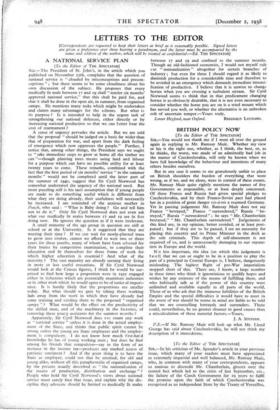A NATIONAL SERVICE PLAN
LETTERS TO THE EDITOR _
[Correspondents are requested to keep their letters as brief as is reasonably possible. Signed letters are given a preference over those bearing a pseudonym, and the latter must be accompanied by the name and address of the author, which will be treated as confidential.—Ed. THE SPECTATOR] [To the Editor of THE SPECTATOR] SIR ,—The President of St. John's, in the article which you published on November 25th, complains that the question of national service is " clouded by misconceptions and precon- ceptions " ; but there seems to be some cloudiness about his own discussion of the subject. He proposes that every medically fit male between 17 and 19 shall "render six months' approved national service," that this shall be paid for, and that it shall be done in the open air, in summer, from organised camps. He mentions many tasks which might be undertaken and claims many advantages for the scheme. But what is its purpose ? Is it intended to, help in the urgent task of strengthening our national defences, either directly or by increasing national production so that we can Letter bear the cost of rearmament ?
A sense of urgency pervades the article. But we are told that the proposal " should be judged on a basis far wider than that of preparation for war, and apart from the dark feeling of emergency which now oppresses the people." Further, I notice that, among other things, the President says we ought to " take immediate steps to grow at home all the timber we can "—though planting trees means using land and labour for a purpose which can have no possible utility for at least twenty years to come. These remarks, combined with the fact that the first period of six months' service " in the summer months " would not be completed until the latter part of the summer of 1940, suggest that Sir Cyril Norwood has somewhat underrated the urgency of the national need. But more puzzling still is his tacit assumption that if young people are made to do something useful which is different from what they are doing already, their usefulness will necessarily be increased. I am reminded of the anxious mother in Punch, who said : " What is Baby doing ? Go and tell him not to do it." Only Sir Cyril Norwood does not even ask what our medically fit males between 17 and 19 are In fact doing now. He ignores the question as if it were irrelevant.
A small minority of the age group in question are still at
school or at the University. Is it suggested that they are wasting their time ? If we can wait for newly-planted trees to grow into timber, cannot we afford to wait two or three years for these youths, many of whom have been selected for their brains by competitive examination, to complete their education and fit themselves for those forms of work for which higher education is essential ? And what of the majority ? The vast majority are already earning their living in more or less useful avocations. If Sir Cyril Norwood would look at the Census figures, I think he would be sur- prised to find how large a proportion were in' 1931 engaged either in industries which are potentially munitions industries or in other work which he would agree to be of natior al import-- once. It is hardly likely that the proportions are smaller today. But what should we gain by taking these working lads away from the work in which they have already had some training and sending them to the proposed " organised camps " ? What would be the effect on the productivity of the skilled men, and of the machinery in the factories, of removing these your g assistants for the summer months ?
Apparently, Sir Cyril Norwood does rot count any work
as national service " unless it is done in the actual employ- ment of the State, and thinks that public spirit cannot be strong unless the young are State employees and the employ-. ment is compulsory. I do not know how much first-hard knowledge he has of young working men ; but does he find. among his friends that compulsion—say in the form 'of an increase in the income tax—produces any marked access of patriotic sentiment ? And if the great thing is, to have the State as employer, could not that be. attained, for old and young alike, without all this, paraphernalia of organised camps, by the process usually described as " the nationalisation of the means of production, distribution and exchange " ? People who hold Sir Cyril Norwood's views about national, service must surely face that issue, and explain why the dis- cipline they advocate should be limited to medically ft males
between 17 and 19 and confined to the summer months. Though an old-fashioned economist, I would not myself rule cut " nationalisation " altogether for certain branches of industry ; but even for these I should regard it as likely to diminish production for a considerable time and therefore to be avoided in an emergency which demands immediate intensi- fication of production. I believe that it is unwise to change horses when you are crossing a turbulent stream. Sir Cyril Norwood seems to think that in that predicament changing horses is so obviously desirable, that it is not even necessary to consider whether the horse you are on is a tried mount which has served you well, or whether the alternative is an unbroken colt of uncertain temper.—Yours truly,


























































 Previous page
Previous page